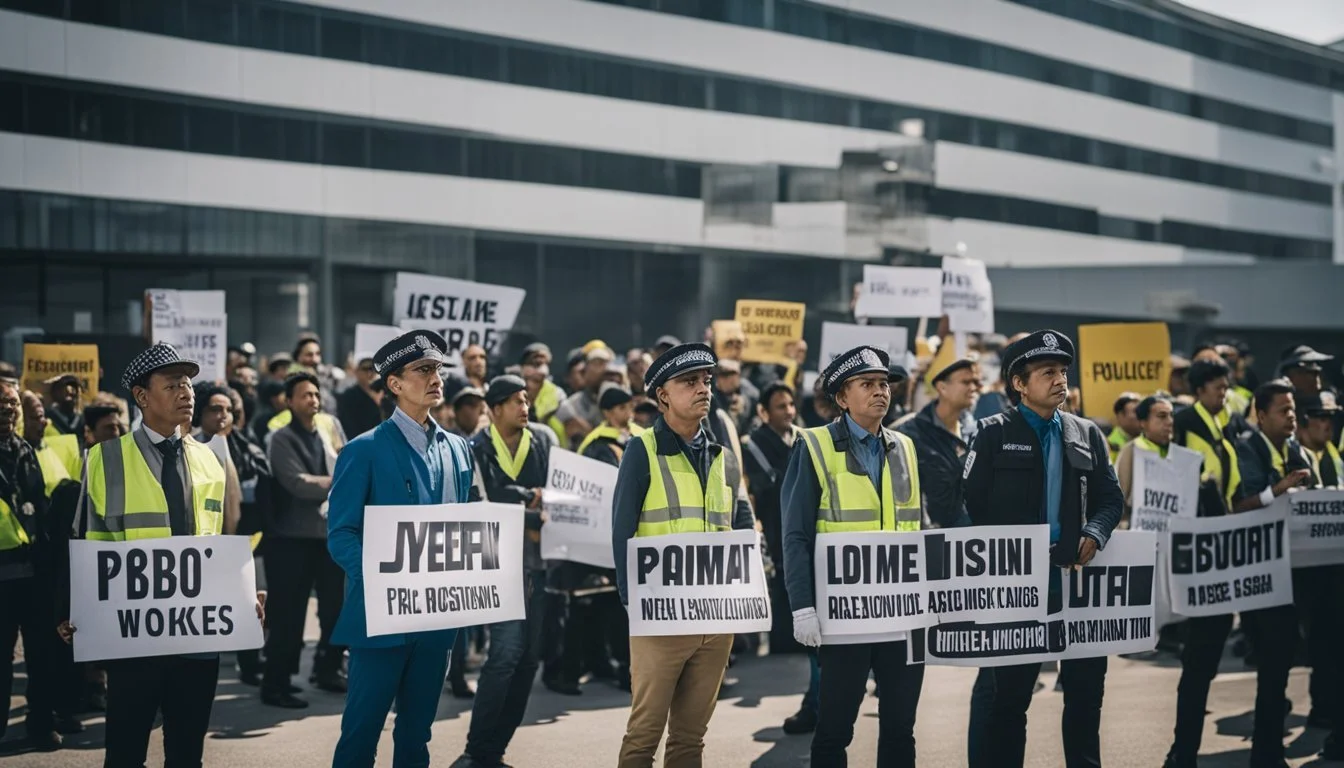Barbara Kopple: Documenting the Struggle for Workers' Rights in Film
Barbara Kopple has long been a key figure in documenting the struggles of America's working class. Her groundbreaking 1976 documentary "Harlan County, USA" provides an unflinching look at the "Brookside Strike," where 180 coal miners and their families took a stand against the Duke Power Company-owned Eastover Coal Company. This film not only won an Oscar for Best Documentary but also brought significant attention to the harsh realities faced by laborers in the mining industry.
What makes Barbara Kopple's work particularly important is her unwavering commitment to showcasing the real-life struggles of workers and the complex dynamics between labor and industry. In "Harlan County, USA," viewers are introduced to the personal stories of the miners and their families, capturing their resilience and solidarity in the face of corporate opposition. This profound exploration of the American labor movement earned Kopple accolades and solidified her reputation as a formidable documentary filmmaker.
Beyond "Harlan County, USA," she continued her exploration of labor conflicts with the 1990 film "American Dream," which focused on a strike by Minnesota meatpackers during the Reagan-Bush era. Kopple's documentaries remain essential viewing for those interested in the history of labor rights, offering a powerful and intimate look at the lives of those fighting for fair working conditions.
Early Life and Career of Barbara Kopple
Barbara Kopple was born on July 30, 1946, in New York City, New York. She grew up in a vibrant urban environment that helped shape her perspectives and creative vision. Her interest in documentary filmmaking began early, influenced by the socio-political events around her.
Kopple attended Northeastern University, where she studied psychology. After college, she ventured into film, working with acclaimed documentarian Albert and David Maysles. This apprenticeship provided her with essential skills in cinema vérité, a documentary style characterized by realistic, observational filmmaking.
In the 1970s, Kopple embarked on her landmark project, "Harlan County, USA." This documentary focused on a coal miners' strike in Kentucky and highlighted the harsh realities faced by labor workers. The film not only showcased her commitment to social justice but also her ability to narrate compelling, authentic stories.
"Harlan County, USA" premiered in 1976 and earned Kopple her first Academy Award for Best Documentary Feature. This groundbreaking work established her as a powerful voice in documentary filmmaking, pioneering a renaissance of cinema vérité in American cinema.
In addition to "Harlan County, USA," Kopple continued to document labor struggles, producing the successful "American Dream" in 1990. This film chronicled the 1985-86 Hormel strike in Minnesota and won her a second Academy Award.
Her early career was marked by a dedication to capturing real-life conflicts and societal issues. The recognition and awards set the stage for her prolific career, continually highlighting the struggles and resilience of everyday people.
Emergence as a Documentary Filmmaker
Barbara Kopple began her career in documentary filmmaking during a period when few documentaries gained mainstream attention. Her early work is distinguished by a focus on labor and social issues.
In 1976, she released Harlan County, U.S.A., a film that would become central to her career. This documentary covered the intense labor strike of coal miners in Harlan County, Kentucky.
Kopple's dedication to capturing real, often dangerous, situations underscored her commitment to authenticity. The film not only highlighted the miners’ fight but also showcased poignant bluegrass music by artists like Hazel Dickens and Merle Travis.
Her work on Harlan County, U.S.A. was recognized with an Academy Award for Best Documentary Feature. The film’s success demonstrated her ability to document social struggles with depth and compassion.
Subsequent projects, like American Dream, further established her as a chronicler of the American working class. This time, she focused on a strike by meatpackers in Minnesota, illustrating her ongoing commitment to labor issues.
Kopple's approach is marked by her willingness to immerse herself in the environments she films. This method has allowed her to create powerful, unflinching narratives that resonate with audiences and critics alike.
Her emergence as a documentary filmmaker set benchmarks for the genre, particularly in the portrayal of labor disputes and social justice issues. Her early successes paved the way for her to become a prominent figure in American documentary cinema.
Harlan County, USA: Anatomy of a Classic
Barbara Kopple's Harlan County, USA premiered in 1976. This documentary centers on the "Brookside Strike," a significant labor dispute involving 180 coal miners and their families. They fought against the Duke Power Company-owned Eastover Coal Company's Brookside Mine in Harlan County, Kentucky.
The film's impact derives from its raw portrayal of the struggle between labor and industry. Kopple and her crew spent years embedded within the community. This allowed them to capture intimate and often harrowing moments. The result is an unflinching look at the harsh realities of a coal miner's life.
Capturing the Struggle
Kopple's dedication provided unprecedented access to the miners' daily lives. Violent confrontations with strikebreakers and law enforcement are starkly documented. This access helped convey the intensity and danger faced by the striking miners and their families.
A Soundtrack to Remember
The film features a haunting soundtrack. Legendary country and bluegrass artists like Hazel Dickens and Merle Travis add emotional depth to the narrative. The music underscores the resilience and spirit of the miners, complementing the visual storytelling.
Recognition and Legacy
Harlan County, USA won the Academy Award for Best Documentary Feature in 1977. This recognition cemented its status as a seminal work in documentary filmmaking. It also highlighted issues of workers' rights and corporate power, resonating with audiences and critics alike.
Kopple's approach to documentary filmmaking in Harlan County, USA set a standard. Its influence can be seen in many modern documentaries tackling social and labor issues.
American Dream: The Labor Movement Continues
"American Dream," directed by Barbara Kopple, examines the 1985-1986 strike against Hormel Foods Corporation in Austin, Minnesota. Hormel cut wages from $10.69 to $8.25 per hour and reduced benefits by 30%, despite reporting a $30 million net profit.
The film highlights the workers' fight to regain fair wages and benefits. Families faced economic hardships as they balanced striking with their day-to-day lives. Kopple's use of cinéma vérité style gives a raw and intimate look at their struggles.
Management's staunch stance against the union played a significant role. The strike became a symbol of the broader labor movement in the mid-'80s, reflecting tensions between corporate profit and workers' rights.
Key Figures in the Strike:
Lewie Anderson
R.J. Bergstrom
Ron Bergstrom
Wayne Goodnature
Kopple not only captures the immediate impact on the workers but also the larger consequences on the community. The documentary earned her another Academy Award, solidifying her role as a crucial voice in documenting labor rights.
Despite the conflict, "American Dream" resonates with anyone who has experienced the struggle for fair labor conditions. The film remains an important piece in understanding the labor movement's history and the ongoing fight for workers' rights.
Exploration of Social Issues Beyond Labor
Barbara Kopple has an extensive career that extends beyond documenting labor struggles. She has tackled a variety of social issues in her films.
Civil Rights
Kopple's recent documentary, GUMBO COALITION, highlights the efforts of civil rights leaders Marc Morial and Janet Murguia. This film underscores her commitment to exploring racial and social justice themes.
Healthcare
In Shelter, Kopple examines homelessness and the challenges faced by families seeking medical care.
Political Campaigns
Her film Havoc, produced for the HBO series America Undercover, captures the chaotic nature of American political campaigns, shedding light on the intricacies and pressures faced by candidates.
Women's Rights
Kopple also ventures into women's rights and gender issues. Miss Sharon Jones! delves into the life of singer Sharon Jones as she battles cancer, portraying her strength and resilience.
Crime and Punishment
Killing at Thurston High investigates school violence and its aftermath, focusing on a tragic school shooting.
Natural Disasters
In New Orleans, Kopple documents the aftermath of Hurricane Katrina, presenting the devastation and the struggle for recovery in affected communities.
Through diverse subjects, Kopple's films provide nuanced views of systemic issues, social justice, and the human condition.
Artistic Style and Filmmaking Techniques
Barbara Kopple's documentaries are known for their raw and unfiltered approach. She often employs direct cinema techniques, immersing viewers in the reality of her subjects' lives without external commentary.
Kopple's handheld camera work gives her films a sense of immediacy and intimacy. This style allows her to capture spontaneous moments and reactions, making the audience feel present in the unfolding events.
She uses natural lighting to maintain authenticity. By avoiding artificial light setups, her work preserves the environment's true visual tone, which enhances the documentary's realism.
Kopple places a strong emphasis on sound design. She often incorporates ambient sounds and voiceovers, which helps in conveying the atmosphere and emotions of the setting.
Interviews are a critical component in her films. Kopple conducts them in a manner that appears conversational, reducing the distance between the subjects and viewers. This method helps extract genuine and heartfelt narratives.
Additionally, her use of archival footage provides historical context and depth to the stories she tells. This technique links past events with ongoing struggles, emphasizing continuity in social issues.
Barbara Kopple intricately edits her films to weave together multiple perspectives. Through montage sequences, she juxtaposes contrasting elements to highlight conflicts and resolutions within the narrative.
Her offering of non-linear storytelling adds complexity and fosters a deeper engagement with the subject matter. This approach allows viewers to piece together the story's full scope by themselves.
Collaborations and Influence
Barbara Kopple has collaborated with a multitude of influential figures in the field of documentary filmmaking. Her collaborations have played a pivotal role in shaping her career and the genre itself.
One of her most notable collaborations was with the striking miners in Harlan County, USA. Living among them for extended periods, she gained intimate access and insight into their lives and struggles.
She also worked closely with labor unions throughout her career. These partnerships significantly influenced her perspective and documentary style, resulting in a unique blend of empathy and hard-hitting realism.
Her influence extends beyond her own films. Kopple has mentored and inspired numerous filmmakers in the documentary space. Many cite her as a key influence in their work, particularly in the realm of social justice and workers' rights.
Kopple's collaboration with various producers and distributors also expanded the reach of her films. This played a crucial role in bringing her documentaries into the mainstream, allowing a wider audience to engage with critical social issues.
Her influence on the genre of cinema vérité is undeniable. By combining journalistic integrity with personal storytelling, she has set a standard for generations of documentary filmmakers. Their continued commitment to uncovering and portraying the truth can often be traced back to Kopple’s groundbreaking work.
Awards and Recognition
Barbara Kopple has garnered tremendous acclaim for her work in documentary filmmaking. She is the first woman to win two Academy Awards in the documentary feature category. Her films Harlan County U.S.A. (1976) and American Dream (1990) both received Oscars, cementing her legacy in the industry.
In addition to her two Oscars, Kopple has earned multiple Emmy nominations. She has been nominated seven times for her contributions to various projects. This recognition highlights her consistent excellence and influence in the field of documentary.
Kopple has also won three Directors Guild of America (DGA) Awards. These awards showcase her technical skill and creative vision, setting her apart as a leading director in her genre.
She received the International Documentary Association (IDA) Career Achievement Award in 2010. This career-spanning honor reflects her long-term impact and dedication to documentary filmmaking.
Barbara Kopple's work has been recognized at Sundance as well. She won the Sundance Grand Jury Prize, further establishing her reputation in the realm of independent film.
Her recent project, Gumbo Coalition, continues to resonate with audiences, and her contributions to documenting key moments in history remain invaluable.
Kopple's Impact on Documentary Filmmaking
Barbara Kopple, a significant figure in the documentary film industry, has had an indelible impact on the genre. She is renowned for her commitment to chronicling the struggles of the working class and amplifying their voices.
Her 1976 documentary "Harlan County, USA" is a seminal work. It captured the harrowing battle of Appalachian coal miners fighting for union rights. This film won an Academy Award and set a new standard for realism and emotional depth.
Kopple's ability to immerse herself in her subjects' lives has led to a new wave of immersive and participatory documentary filmmaking. Her approach emphasizes empathy and authenticity.
She has mentored numerous filmmakers, influencing a generation that values the ethical considerations and responsibility of documentary storytelling.
Innovation: Kopple's work is characterized by her innovative use of direct cinema techniques. These methods include minimal interference and the reliance on natural sound and lighting, which provide an unfiltered, raw portrayal of reality.
Notable Works:
"American Dream" (1990): This film highlighted the plight of striking meatpackers, winning another Oscar.
Various other documentaries that scrutinize social issues and worker rights.
Her films often reveal the intersection of personal and political struggles, making complex social issues accessible to a broad audience.
Kopple's legacy in documentary filmmaking is marked by her dedication to social justice, meticulous craftsmanship, and trailblazing approaches, which continue to inspire and educate future documentarians.
Contemporary Works and Projects
Barbara Kopple has continued her prolific career with several contemporary works that underscore her commitment to documenting social issues and workers' rights.
In 2015, Kopple directed "Miss Sharon Jones!", which follows the personal and professional challenges faced by soul singer Sharon Jones. The film's focus on resilience aligns with Kopple's broader narrative style.
In 2016, she released "Shelter," a documentary examining homelessness in America. Through intimate storytelling, Kopple sheds light on the lives of children and their families experiencing homelessness.
Another notable work is "This Is Everything: Gigi Gorgeous" (2017). The film chronicles the life of YouTube star Gigi Gorgeous, exploring themes of gender identity and transformation. Kopple's sensitive approach to personal stories shines through this project.
During the COVID-19 pandemic, Kopple explored the impact of the crisis on musicians in "Dolly Parton: Here I Am," providing a unique glimpse into the resilience of artists during challenging times.
Table of Select Contemporary Works
Year Title Subject 2015 Miss Sharon Jones! Soul singer Sharon Jones 2016 Shelter Homelessness in America 2017 This Is Everything: Gigi Gorgeous Gender identity 2020 Dolly Parton: Here I Am Impact of COVID-19 on musicians
Kopple's recent projects maintain her focus on powerful, human-centered narratives. She continues to capture the essence of resilience and struggle in modern contexts, solidifying her place as a significant voice in documentary filmmaking.
Her work consistently highlights underrepresented communities, proving her unwavering dedication to social justice.
The Legacy of Barbara Kopple
Barbara Kopple's work has left an indelible mark on the documentary film industry. She gained widespread acclaim with her 1976 film Harlan County, USA, which documented the intense struggle of coal miners in Kentucky. Kopple's commitment to capturing the raw realities of workers' rights issues has set a gold standard.
Kopple's talent lies in her ability to earn the trust of her subjects. She spends extensive time within communities, creating films that feel both intimate and powerful. This approach can be seen in Miss Sharon Jones! and American Dream, both of which offer personal yet impactful narratives.
Her influence extends beyond her own films. Kopple has played a pivotal role in mentoring the next generation of documentarians, particularly women. Her career trajectory has positioned her as a figure of leadership and inspiration in the industry.
Work Year Impact Harlan County, USA 1976 Academy Award winner, labor rights icon American Dream 1990 Academy Award winner, labor movement Miss Sharon Jones! 2015 Intimate look at a musician's struggle
Influence and Recognition
Barbara Kopple’s works not only entertain but educate and inspire action. Her dedication to factual storytelling without exploitation has solidified her reputation.
In the realm of documentary filmmaking, her name stands out for both critical and commercial success. Her films continue to be studied and referenced for their compelling storytelling and ethical filmmaking practices.




